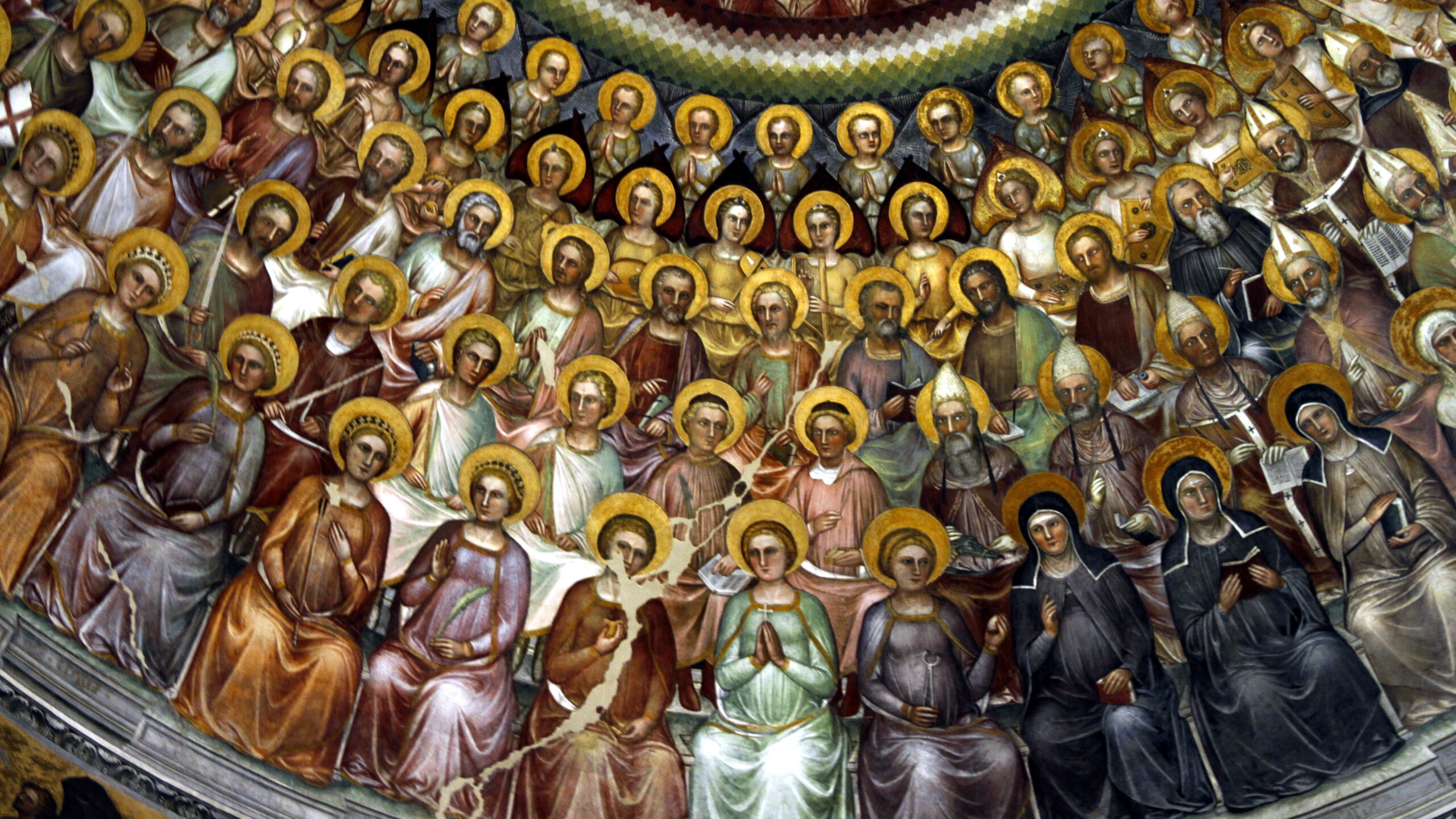Today the Church celebrates the Solemnity of All Saints. The saints are the great heroes of our faith. The Church describes a saint as a person of “heroic virtue.” This means that while many Christians might be willing to settle for lackluster accomplishments as disciples, the saints engage their relationship with the Lord Jesus with vigorous creativity and absolute dedication. Most often, the work of the saints will go unnoticed and unseen. Saints are not celebrities, and those saints who capture the attention of the world, view that renown as the imposition of a cross.
Most saints will disappear into the mission of the Church.
In heaven, we will know the profound impact thousands of hidden saints had on our lives, but here on earth, as I said, most of the saints move about and work among us, and do so for the most part unnoticed and unseen.
The work of the saints is not completed with their deaths. The saints know better than most Christians that life here in this world is not merely an end in itself, but a means by which God prepares us for a greater and more important mission in heaven. No one who is in heaven is indolent. Heaven is not a place of indifference to this world but one of interaction and intercession. This means that the saints continue their mission as disciples of the Lord Jesus, supporting and sustaining the Church, acting to help and support all the baptized.
The conflict between the dark powers of sin, death, and the devil has consequences for the Church as it engages her mission in the world.
The first scripture for today’s Mass of All Saints is an excerpt from the New Testament Book of Revelation. The Book of Revelation is one of the most mysterious, complex, and misunderstood books of the Bible. It is a theological commentary on events from the past, present and future and it communicates important spiritual insights through fantastic images and symbols. The common impression is that the Book of Revelation is about the end of the world, and as such people are often terrified by its content.
But, properly understood, the Book of Revelation is not simply frightening, but reassuring, as it foresees the victory of God in Christ over all the dark powers, worldly and otherworldly that oppose him.
The Book of Revelation is not simply about the end of the world, but the beginning of a new world in which the great enemies of God, and therefore the enemies of humanity are defeated by the power of God in Christ. These enemies are sin, death, and the devil.
The conflict between the dark powers of sin, death, and the devil has consequences for the Church as it engages her mission in the world. The Church is opposed as Christ was opposed. The Church suffers as Christ suffered. And in all this, the saints are on the front lines of the battle.
The Book of Revelation displays all that I just described in symbolic or metaphorical terms. What you heard about was a vast assembly of people from all over the world, clothed in white, who proclaim the coming victory of God in Christ. Who are these people? The text tells us: they are Christians whose heroism was revealed in their willingness to be killed rather than renounce their Christian faith or cooperate with the dark powers.

Thus, our first scripture for today is about a particular kind of saint: the martyr. We live even right now in an age of martyrs as multitudes of Christians in Asia, Africa, and the Middle East are persecuted and killed because they are disciples of the Lord Jesus. We might think that the greatest challenge to the Church today is whether or not we should conform to secular values, but far more important than this is the brutal fact that for millions of Christians, professing and practicing the Christian faith can cost you not just your livelihood, but also your very life.
On this day when the Church celebrates the saints, it would be good for us to remember that what is demanded of us as followers of the Lord Jesus is often times far less than what it demanded of others.
We are not compelled by circumstances to die for our Faith in Christ, but are we willing to live for it? If our sacrifice is not to be that of a martyr, what is the sacrifice we will offer?
Our second scripture is a brief passage from the First Letter of John, in which the evangelist articulates an important insight about our identity as Christians. We are not as Christians merely members of a faith-based social club, an ethnic or cultural association, political action committee, or supporters of a 501C3 non-for-profit initiative. In the words of Pope Francis, the Church is not an “NGO,” a non-governmental social service organization.
Being a child of God is not just some privileged title, but a responsibility, an identity, a mission that a Christian accepts.
What are we then? The evangelist John tells us: we are the children of God.
This means that God has made us in Christ his beloved children, and just as children are an expression of their parents love, so too Christians are meant to be for the world an expression of God in Christ’s love.
Being a child of God means aspiring to be like the One who is revealed to be God’s only beloved Son: Jesus Christ. Being a child of God is not just some privileged title, but a responsibility, an identity, a mission that a Christian accepts. The Christian, as a child of God, is meant to be an expression to others of Christ himself. Thus, when a Christian is baptized, he or she is proclaimed to be what is termed an “alter Christus,” that literally means “another Christ.”
The saints are expressions of Christ-likeness par excellence. The saints “re-present” Christ to us and through the saints Christ acts and introduces himself to us. Saints are not just nice, friendly people who do good things for society, but they are Christians who, aspiring to serve Christ as disciples, are given the gift of becoming ever more like him.
And that observation brings me to an important clarification: when a Christian is baptized, what is happening to that person is not just inclusion into a community. No!
What happens when a Christian is baptized is that the person is chosen by Christ to be like him—a person is chosen by Christ to be a saint. The realization of your life as a Christian is not simply that you become a member of a faith-based club or matriculate through faith-based institutions, but that you become a saint. That’s what Baptism is all about; indeed, that’s what all the sacraments and the whole life of the Church is about. Being a Christian is about being chosen by Christ to be a saint. “You have not chosen Christ, he has chosen you!” You will never begin to understand what the Christian life is all about until you understand this universal summons to holiness, this summons to be a Christian, which is God in Christ choosing you to be a saint!

Finally, in his Gospel, the Lord Jesus presents what are known as the “Beatitudes,” a proclamation of those who are truly blessed by God and who enjoy God’s favor.
In worldly terms, the blessing of God, the favor of God, is many times construed in categories of worldly success or exemption from the harder facts of human existence. Some see God’s blessing in being the recipient of prosperity and wealth, talent and good looks, power and prestige. God’s favor happens, according to some, when they are exempt from having to suffer or to struggle. But Christ the Lord upends these kinds of expectations and declares that the blessing of God and the favor of God is given, not to those who have the most, but those who have the least; not to those whom the world esteems as successful, but to those who seem to the world to have failed; not to those who have power, but to those who seem to have no power at all; not to those whom the world considers to be significant or influential, but to those who go mostly unnoticed and unappreciated.
In other words, in his Beatitudes, God in Christ announces a revolution!
Blessing is not simply getting what we want but having the opportunity to give to others what they truly need. God’s favor is not an exemption from the hard facts of life, but God’s favor is found within the hard facts of life.
Do our decisions make of us men and women of the Beatitudes?
The saints exemplify the Beatitudes of the Lord Jesus, so their blessing and favor will look like the strange blessing and favor that the Lord Jesus describes. The saints not only exemplify the Beatitudes in the decisions they make about the way they live, but also in whom they will seek to serve and choose to associate with. The saints will seek the company of the kinds of people that Christ describes in his Beatitudes.
Consider the decisions you have made about your life. Have these decisions made you a person whose life looks like the life described in the Beatitudes? Consider the people with whom you associate and whom you esteem. Are these people like the people described in the Beatitudes?
And in our answers to these questions is the challenge for all of us would be saints, saints in the making. Do our decisions make of us men and women of the Beatitudes? How many of the people that we seek the company of and consider to be our friends look and live like the kinds of people Christ describes as being truly deserving of his blessing and favor?
Originally published on November 1, 2017 on Evangelization and Culture Online.
